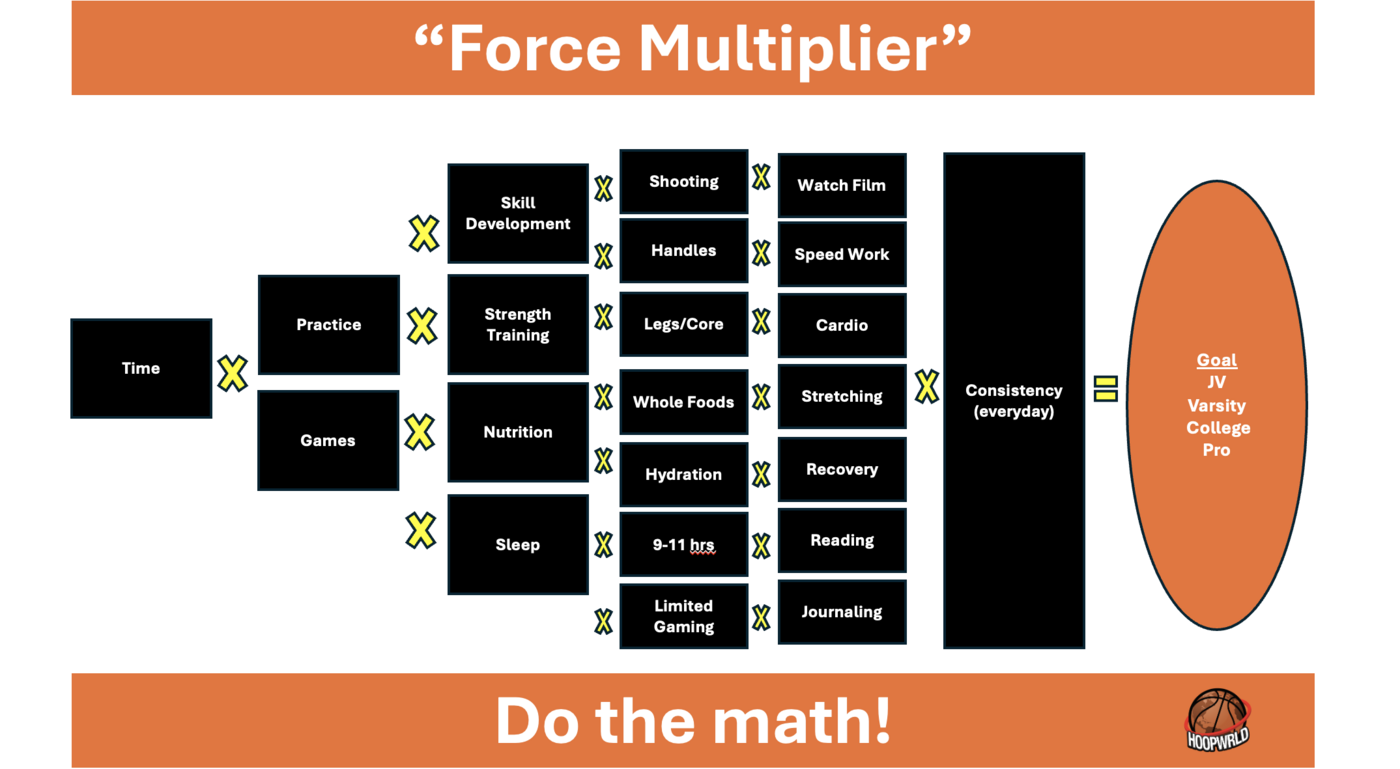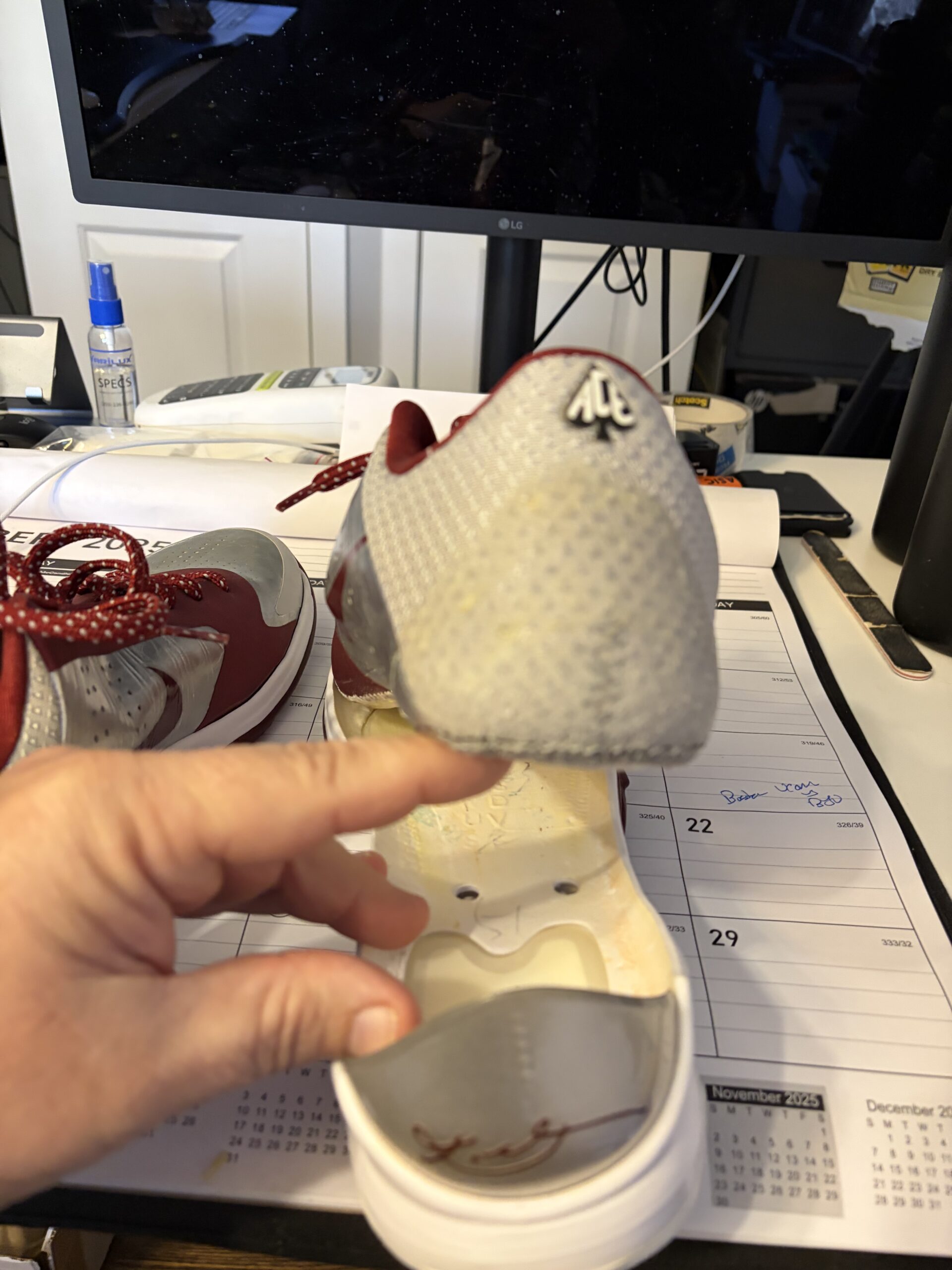Every hooper knows the basics: show up to practice, play games, put in your time. But here’s the hard truth—if that’s all you’re doing, you’re leaving serious gains on the table. The difference between players who plateau and those who break through to the next level isn’t just talent or luck. It’s understanding that everything beyond the bare minimum becomes a force multiplier.
The Math of Basketball Development
Think of your basketball development like a mathematical equation. Practice and games are your base number—let’s call it a 2. That’s your foundation, and without it, you’ve got nothing. But here’s where it gets interesting: every additional element you add doesn’t just add to your development, it multiplies it.
When you add strength training, you’re not going from 2 to 3. You’re going from 2 to 2 × 1.5. Add proper nutrition? Now you’re at 2 × 1.5 × 1.3. Throw in quality sleep, film study, and consistent recovery work, and suddenly your baseline development of 2 becomes 8, 10, or even 15.
This is why two players with similar talent and practice time can have drastically different trajectories. One is doing the minimum and staying at that base level. The other is stacking force multipliers and watching their game compound exponentially.
We Know Your Plate Is Full
Let’s be real for a minute. You’ve got school assignments due tomorrow. Your parents want family time. Your friends are hitting you up to hang out. Maybe you’re working a part-time job or dealing with responsibilities at home. Social media is constantly pulling at your attention. We get it—your life is packed, and basketball is just one piece of a very complicated puzzle.
The pressure is real. Teachers expect your best. Your family deserves your attention. Your friends want the old you back, the one who was always available. And somewhere in all of that chaos, you’re supposed to find time to become elite at basketball? It feels impossible some days.
But here’s what separates the dreamers from the achievers: elite players don’t have more time—they make different choices with the time they have.
Time: Your Biggest Enemy (And Everyone Else’s)
Time doesn’t care about your dreams. It doesn’t give you extra hours because you want something badly. It treats everyone the same—24 hours a day, no exceptions, no negotiations. The kid you’re competing against for that scholarship? He gets the same 24 hours you do. The difference is what he’s willing to sacrifice to make those hours count.
Here’s the scary part: time moves faster than you think. One minute you’re a freshman walking into high school, thinking you’ve got four whole years to figure it out. Basketball feels like this distant thing you’ll get serious about “eventually.” You’ve got time, right? Then you blink and you’re a sophomore, still telling yourself you’ve got plenty of runway.
But time has this cruel way of accelerating. Junior year hits and suddenly college coaches are watching. Senior year arrives like a freight train, and you’re sitting there with a transcript full of “shoulda, coulda, woulda.” The players getting recruited? They weren’t more talented than you freshman year—they just understood something you didn’t: there is no tomorrow when it comes to your development.
Every day you wait is a day your competition gets better. Every workout you skip is ground you’ll never make up. Every “I’ll start next week” becomes another week closer to the end of your high school career.
This is where planning becomes your superpower. You can’t wing your way to elite performance. You need to look at your week like a chess board and make strategic moves. Maybe that means waking up 45 minutes earlier for a workout. Maybe it’s meal prepping on Sundays instead of scrolling through your phone. Maybe it’s choosing film study over Netflix three nights a week.
The Sacrifice Nobody Talks About
Here’s the part that’s hard to hear: becoming elite is lonely sometimes. While your friends are hanging out, you might be in the gym. While they’re staying up late gaming, you’re getting the sleep your body needs to recover. While they’re eating whatever’s convenient, you’re thinking about how your nutrition affects your performance tomorrow.
Your social circle might not understand. They might call you obsessed or say you’ve changed. Some friendships might fade because you’re not as available as you used to be. That hurts. We won’t pretend it doesn’t.
But remember why you started this journey. That goal on your wall—JV, Varsity, College, Pro—it’s not going to achieve itself. Every elite player has walked this path. They’ve all had to choose their future over their present comfort. They’ve all felt the weight of sacrifice.
Discipline: Your Daily Decision
Motivation gets you started, but discipline keeps you going when motivation fails. And motivation will fail—on the days when you’re exhausted, when your friends are having fun without you, when progress feels slow, when nothing seems to be working.
Discipline is what gets you to the gym when you don’t feel like it. It’s what makes you choose the grilled chicken over the fast food. It’s what keeps you studying film when your favorite show just dropped a new season. Discipline isn’t a feeling—it’s a decision you make over and over again, especially when you don’t want to.
The beautiful thing about discipline is that it builds on itself. Each time you make the harder choice, the next hard choice becomes a little easier. Your tolerance for discomfort grows. Your ability to delay gratification strengthens. You become someone who does what they say they’re going to do, regardless of how they feel in the moment.
The Planning Advantage
Elite players don’t leave their development to chance. They plan their weeks, their meals, their recovery, their study time. They know exactly when they’re training, what they’re working on, and how it fits into their bigger picture.
Start simple. Map out your non-negotiables: school, family obligations, practice, games. Then look at the gaps. Where can you fit 20 minutes of strength training? When can you watch film? How can you optimize your meals without adding hours to your day?
Maybe Sunday becomes your planning day. Maybe you batch your homework to create longer training blocks. Maybe you find ways to combine activities—listening to basketball podcasts while doing chores, or studying game film while eating breakfast.
Beyond the Court: Where Real Growth Happens
The magic happens in the margins—those hours when you’re not dribbling a basketball but still working toward your goal. Your body is either recovering optimally or breaking down. Your mind is either studying the game or letting opportunities slip by. Your nutrition is either fueling peak performance or holding you back.
Consider hydration alone. Most players think they’re hydrated because they drink water during practice. But proper hydration starts the moment you wake up and continues throughout the day. When you’re truly hydrated, your reaction time improves, your endurance increases, and your recovery accelerates. That’s not just an addition to your game—it’s a multiplier that enhances everything else you do.
The same principle applies to sleep. Nine to eleven hours isn’t just about feeling rested. It’s when your body synthesizes the skills you practiced, repairs muscle tissue, and consolidates the film you studied. Shortchange your sleep, and you’re essentially putting a cap on how much you can improve, no matter how hard you work during the day.
The Consistency Compound
Here’s where most players fail: they think force multipliers are optional luxuries for when they “have time.” But consistency is the ultimate force multiplier, and it doesn’t negotiate with your schedule. The player who does mobility work for 10 minutes every single day will see more improvement than the one who does an hour-long session once a week.
This is why the diagram shows consistency as the final gateway before your goal. Everything else—the strength training, the film study, the nutrition—only becomes a true force multiplier when it’s consistent. Inconsistent habits don’t multiply; they just create noise.
The Compound Effect of Small Sacrifices
Every small sacrifice compounds over time. Choosing sleep over late-night hangouts might not feel significant today, but after months of better recovery, your game will be noticeably sharper. Spending 15 minutes on mobility work instead of scrolling social media seems minor, but it prevents injuries that could derail your entire season.
The players who make it aren’t necessarily the most talented—they’re the ones who made the most consistent sacrifices over the longest period of time. They chose their future selves over their present comfort, day after day, week after week, year after year.
It Will Be Worth It
We won’t sugarcoat the journey—it’s hard. There will be days when you question if it’s worth it. There will be moments when you feel like you’re missing out on being a “normal” teenager. There will be times when the sacrifice feels heavier than the dream.
But here’s what we know: every elite player who’s walked this path will tell you the same thing. The nights they stayed in to get proper sleep, the hours they spent in the gym while others were hanging out, the disciplined choices they made when no one was watching—all of it was worth it for the moment they achieved their goal.
Your future self is counting on the choices you make today. The work you put in when no one’s watching. The sacrifices you make when it’s hard. The discipline you show when motivation fails.
Keep Grinding
The path to elite isn’t crowded because most people aren’t willing to pay the price. They want the destination without the journey. They want the results without the sacrifices. They want the glory without the grind.
But not you. You’re reading this because you’re different. You’re willing to do what others won’t so you can have what others can’t. You understand that time is your enemy, but planning and discipline are your weapons.
The road ahead is challenging, but it’s not impossible. Every day you have a choice: stay comfortable or get closer to your goal. Choose progress. Choose discipline. Choose your future over your present comfort.
Keep grinding. Your breakthrough is closer than you think.





